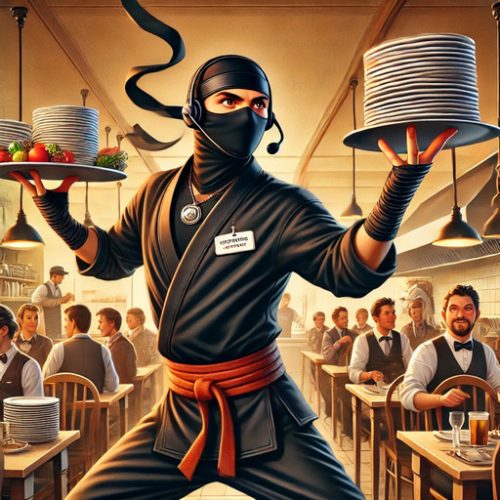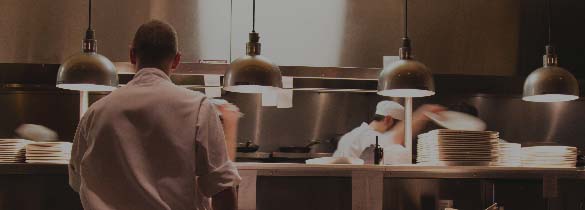Top 10 Characteristics of a Restaurant Manager


Imagine a group of chefs, servers, and hosts working in perfect sync to deliver a memorable dining experience. In many restaurants, that level of collaboration is cultivated by an exceptional manager. From guiding operational efficiency to ensuring customer satisfaction, the characteristics of a great restaurant manager can have a radical impact on the restaurant’s profitability, staff morale, and reputation.
Restaurant leaders inspire, organize, and constantly adapt to the changing perspective of the hospitality industry. Below, we’ll examine the top 10 characteristics of a restaurant manager, along with some restaurant manager skills and qualifications, so you’ll know exactly what it takes to excel in this fast-paced and rewarding role.
Top 10 Characteristics of a Restaurant Manager
1. Excellent Communication Skills
One of the hallmark characteristics of a good restaurant manager is clear and open communication with every member of the team. Restaurants are hectic environments where instructions must be understood quickly and accurately.
Why it matters:
- Miscommunication can lead to customer dissatisfaction, wasted resources, and friction among staff.
- A manager who communicates well fosters an environment of trust.
How to develop:
- Engage in active listening during team meetings.
- Use concise language and confirm understanding by having team members repeat instructions.
Quick Tip: Encourage an open-door policy. Staff who feel heard and supported are more likely to stick around and perform at a high level.
2. Strong Leadership and Team Building
Every managerial characteristic of a restaurant manager begins with leadership, knowing how to guide and motivate a diverse group of people. Leadership is more than just yelling orders, it’s more about creating a positive work environment and empowering each team member to do their best.
Why it matters:
- Staff retention is higher when they feel valued and guided.
- Strong leadership sets the tone for the entire restaurant, creating a cohesive brand identity for both employees and customers.
How to develop:
- Take genuine interest in your staff’s well-being and professional goals.
- Lead by example: Show punctuality, discipline, and respect so that the team will follow suit.
Quick Tip: Host regular team-building exercises or outings. This helps break down barriers and builds camaraderie.
3. Adaptability and Problem-Solving
If there’s one certainty in the restaurant business, it’s that surprises will happen—orders get mixed up, staff call in sick, or the kitchen equipment fails at the worst possible moment. Being adaptable is a defining characteristic for any restaurant general manager.
Why it matters:
- Quick, level-headed responses to unexpected issues keep the restaurant running smoothly.
- A manager who panics can pass that stress onto the staff, causing further mistakes.
How to develop:
- Practice staying calm under pressure. Take a few seconds to breathe and assess the situation before taking action.
- Create contingency plans for common problems, such as staff shortages or delayed inventory deliveries.
Quick Tip: Encourage staff to bring solutions, not just voicing existing problems. This creates a problem-solving culture where everyone takes ownership.
4. Deep Understanding of Restaurant Operations
When considering the requirements for a restaurant manager, industry knowledge is non-negotiable. Successful managers know front-of-house operations like seating plans and customer service, as well as back-of-house operations like inventory management and food preparation, inside and out.
Why it matters:
- In-depth knowledge helps you make informed decisions, from adjusting menus to scheduling staff.
- It builds credibility with your team. Staff respect leaders who understand the challenges of each role.
How to develop:
- Learn by doing: Spend time in each department to gain first-hand experience.
- Keep up with industry trends (e.g., online reservations, contactless payment) to stay competitive.
Quick Tip: Regularly cross-train employees so they can fill in when needed. This not only develops versatile staff but also gives you deeper operational flexibility.
5. Financial Savvy and Budget Management
A restaurant leader is required to keep an eye on the bottom line while ensuring customer satisfaction as understanding budgets, costs, and revenue streams is crucial for a restaurant’s long-term success.
| Key Financial Areas | Manager’s Role |
| Food & Beverage Costs | Track inventory and prevent over-ordering or waste. |
| Labor Costs | Schedule staff efficiently to optimize productivity. |
| Profit & Loss (P&L) Statement | Review regularly to identify trends and areas for savings. |
| Capital Investments | Evaluate ROI on equipment upgrades or facility expansions. |
Why it matters:
- Without proper financial management, even a popular restaurant can fail.
- Profitable operations ensure stable jobs for staff and better opportunities for growth.
How to develop:
- Take courses or workshops in basic accounting or financial management to acquire top characteristics of a restaurant manager.
- Use technology tools or point-of-sale (POS) systems for real-time expense tracking.
Quick Tip: Conduct weekly or monthly financial reviews with your accountant or bookkeeper. Spotting a small problem early can prevent major losses later.
6. Customer-Centric Mindset
Ultimately, the restaurant industry is a people-driven business. Characteristics of a great restaurant manager almost always include an unwavering focus on customer satisfaction.
Why it matters:
- Positive dining experiences create repeat customers and word-of-mouth marketing.
- Happy guests often leave online reviews, helping your restaurant stand out from the competition.
How to develop:
- Train staff to greet and engage customers warmly from the moment they walk in.
- Implement a feedback loop by offering easy ways for customers to voice concerns or praise.
Quick Tip: Occasionally “walk the floor,” speaking directly with customers. Genuine interaction lets guests feel valued and provides real-time feedback.
7. Organizational and Time-Management Skills
With so many moving parts, such as inventory, staff schedules, reservations, strong organizational skills are crucial. Being able to juggle multiple tasks and prioritizing them effectively is among the top characteristics of a restaurant manager.
Why it matters:
- Disorganization leads to missed reservations, wasted inventory, and poor staff morale.
- Effective time management keeps operations running on schedule, reducing delays and customer wait times.
How to develop:
- Use digital tools (e.g., scheduling apps, task management software) to keep track of shifts and tasks.
- Break large projects (like menu redesign) into smaller, manageable steps with deadlines.
Quick Tip: Delegate responsibilities to trusted staff. Micromanaging often leads to bottlenecks, stress, and potential errors.
8. Ability to Train and Mentor Staff
If you want to know how to be the best restaurant manager, look no further than your training program. Successful managers invest in people by providing continuous mentorship and professional development opportunities.
Why it matters:
- Well-trained staff offer consistent service, reducing mistakes and enhancing the customer experience.
- Mentoring employees fosters loyalty and can lower turnover rates by saving hiring and onboarding costs.
How to develop:
- Create a structured onboarding process, complete with checklists and shadowing sessions.
- Offer regular performance reviews and actionable feedback so employees know how they can improve.
Quick Tip: Spotlight high-performing staff. By recognizing accomplishments, you incentivize others to step up their game.
9. Positive Attitude and Professionalism
Among the qualities of a restaurant manager, attitude and professionalism often go hand-in-hand. Your demeanor sets the cultural tone in the restaurant – if you’re upbeat and respectful, your staff will likely follow suit.
Why it matters:
- Morale can drop quickly under a negative manager, affecting customer satisfaction and staff retention.
- Professionalism in dealing with conflicts ensures that issues are resolved fairly and respectfully.
How to develop:
- Practice emotional intelligence by understanding your own stress triggers and managing them effectively.
- Treat each team member consistently and fairly, maintaining a clear code of conduct.
Quick Tip: If you feel overwhelmed, take a short break to decompress before dealing with staff or customer issues. A composed manager is far more effective at resolving problems.
10. Continuous Learning and Innovation
Last but not least, a top managerial characteristic of a restaurant manager is the eagerness to learn and improve continually. The hospitality industry never sits still as new trends, dietary preferences, and technologies emerge all the time.
Why it matters:
- Staying updated helps you keep your menu, ambiance, and operations fresh.
- Continuous learning ensures you’re prepared for emerging challenges like new health regulations or market shifts.
How to develop:
- Attend industry conferences, trade shows, and local workshops to stay informed.
- Subscribe to restaurant management blogs or podcasts for quick, daily insights.
Quick Tip: Involve your team in brainstorming sessions for new menu items or promotional ideas to exhibit the characteristics of a restaurant manager. Collective input can lead to breakthrough innovations.
Additional Qualifications & Skills for a Restaurant Manager
In addition to the above-mentioned characteristics, there are some other qualifications and skills needed for restaurant manager roles. Requirements for a restaurant manager typically include:
- Formal Education – Even though practical experience is what’s most valuable, certain organizations may prefer a degree or certification in hospitality management.
- Experience – Hands-on experience in different restaurant roles can be helpful in understanding the full scope of operations.
- Soft Skills – Abilities like communication, leadership, problem-solving, and conflict resolution.
- Technical Skills – Ideal restaurant general manager skills may also include familiarity with POS systems, reservation platforms, and basic accounting software.
Putting It All Together to Be a Good Manager at a Restaurant

If you’re wondering how to be good restaurant manager focus on embodying these core traits:
- Effective Communication
- Leadership & Team Building
- Adaptability & Problem-Solving
- Operational Knowledge
- Financial Acumen
- Customer Focus
- Organizational Skills
- Staff Training & Mentoring
- Positive Attitude & Professionalism
- Commitment to Continuous Learning
As you cultivate these characteristics of a restaurant manager, you’ll find yourself well-equipped to shine in a cutthroat industry. Moreover, matching these traits with the qualifications of a restaurant manager sets you on a path to become a vital asset to any restaurant.
To Sum It Up
If you want to manage a successful restaurant, you would need to build a culture of excellence by exhibiting strong leadership skills, adaptability, and a keen focus on every tiny aspect of the dining experience. You will find the characteristics listed above immensely helpful on your journey. Work on these traits, and you would be well on your way to becoming a skilled restaurant manager!
However, you must also remember that this journey is never truly complete. Whether you have been in this field for years or just starting out, staying curious will help you master all the required characteristics of a restaurant manager. You may also find interesting to read an article about the restaurant manager’s bonus structure.
2440 total views, 18 today







